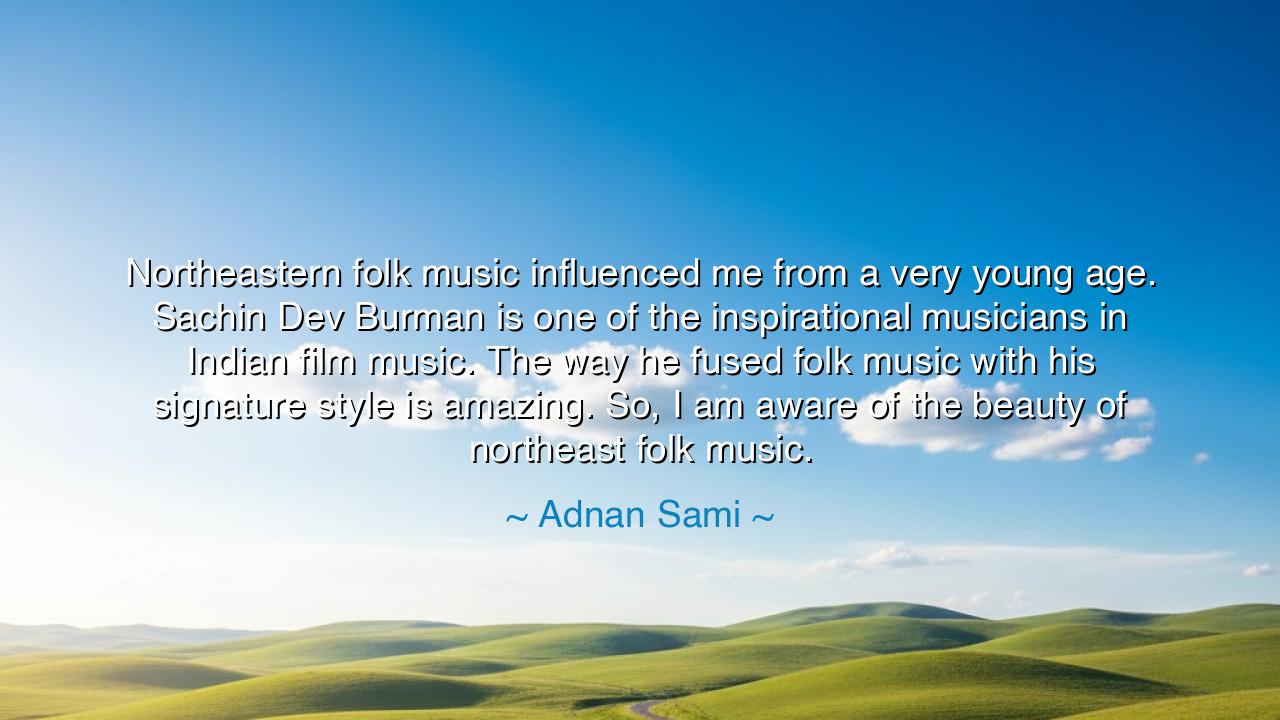
Northeastern folk music influenced me from a very young age.
Northeastern folk music influenced me from a very young age. Sachin Dev Burman is one of the inspirational musicians in Indian film music. The way he fused folk music with his signature style is amazing. So, I am aware of the beauty of northeast folk music.






In the soulful words of Adnan Sami, we find both reverence and revelation: “Northeastern folk music influenced me from a very young age. Sachin Dev Burman is one of the inspirational musicians in Indian film music. The way he fused folk music with his signature style is amazing. So, I am aware of the beauty of northeast folk music.” Here speaks a disciple of tradition and innovation alike — an artist who honors the past even as he shapes the present. His reflection is not merely a tribute to folk music or to Sachin Dev Burman, but a declaration of the eternal truth that roots give wings — that the most enduring creativity springs not from detachment, but from deep connection to one’s cultural soil.
To understand the heart of this quote, one must first know the legacy of Sachin Dev Burman, the legendary composer who carried the rhythm of Bengal’s rivers and the cadence of its villages into the great halls of Indian cinema. He was a bridge between worlds — between the primal and the poetic, the traditional and the modern. His music, born of folk melodies, carried the raw simplicity of the countryside yet spoke to the refined spirit of the city-dweller. It was the voice of the fisherman and the philosopher alike. When Adnan Sami calls him an inspirational musician, he is not simply praising talent — he is recognizing a man who understood that authenticity is the soul of all art.
The origin of this inspiration lies in the sacred bond between the artist and the land. The folk music of Northeast India — rich with rhythms of the hills, rivers, and rain — is not written on paper but etched into the hearts of its people. Its beauty lies in its simplicity and its closeness to nature. Each song tells a story: of harvest, of love, of longing, of divine connection. For young Adnan Sami, growing up in a world of shifting sounds and modernity, such music would have been a revelation — a reminder that all complexity in art must ultimately return to truth, and that truth lives in the voice of the people.
Throughout history, the greatest masters have found genius in the humble melodies of their ancestors. The composer Antonín Dvořák drew from Czech folk songs to write his immortal symphonies; Béla Bartók roamed the countryside of Hungary, recording the songs of peasants to preserve them from vanishing; and S.D. Burman, much like them, infused his cinematic compositions with the spirit of his homeland. Each of these visionaries understood that folk music is not primitive — it is pure. It is the heartbeat of civilization, older than any written score and more honest than any performance stage.
When Adnan Sami speaks of Burman’s “fusion of folk music with his signature style,” he celebrates the eternal art of transformation — of taking what is old and breathing into it something timeless. True fusion, as the ancients taught, is not a collision of opposites, but a union of essences. Burman did not decorate folk music with modernity; he let its spirit lead him, allowing new instruments and arrangements to serve its emotion, not overshadow it. In this, he reflected the principle that all creation must remain rooted in reverence — for an artist who forgets his origins, forgets himself.
Sami’s awareness of the “beauty of northeast folk music” is more than appreciation; it is an awakening. He sees in it not only melody, but philosophy — the reminder that music, at its core, is not about fame or form, but about connection. Folk music speaks to the shared humanity within us; it dissolves boundaries of language, class, and creed. It is the echo of ancestors who sang to survive and to celebrate, whose songs carried their dreams across generations. For a modern artist to listen deeply to those voices is to partake in the continuity of creation itself.
From these reflections, a lesson unfolds: honor your roots, for they are the foundation of your flight. Whether in art, work, or life, remember that innovation without heritage is hollow. Learn from the elders, from the land, from the songs that have endured because they were born of sincerity. Seek the beauty that lies not in perfection, but in authenticity.
So, let the wisdom of Adnan Sami’s words guide you — listen to the songs of your own culture, your own history, and your own heart. Do not be seduced by the noise of the new until you have understood the harmony of the old. For it is from such harmony that true artistry is born — that rare and sacred blend, as exemplified by Sachin Dev Burman, where tradition becomes timeless and music, once again, becomes inspirational.






AAdministratorAdministrator
Welcome, honored guests. Please leave a comment, we will respond soon